2002 年 3 月翻译资格中级英语口译笔试真题及答案
this part of
the test, you will hear a passage and read
Part A: Spot Dictation
the same
Directions: In
passage with blanks in it. Fill in each of the blanks with the ward or words you
have heard on the tape. Write your answer in the corresponding space in you ANSWER
BOOKLET. Remember you will hear the passage ONLY ONCE.
For most of us, success and the ability to control our own fate are linked to our
(1).
ability to lead. Leadership, in fact, is something that______________
A leader does not necessarily occupy a formal leadership______________
(2),
for example, as the assistant secretary of state or the chief executive officer.
Very often people with______________
necessarily leaders. Parents,
spouses, teammates,______________
(4),friends, classmates or playmates can
all be leaders if______________(5). A teacher can also be as a leader as he or she
is a friend. In fact, most of us spend a great deal of time trying to______________
(7) of
(6) to do willingly what we want them to do, and that,______________
the term, is what leadership is all about. Of
(8) to
do things for a short period of
time, but that is not leadership. A true leader
is apt to______________
(9) other people to accept his ideas, to follow him and
to______________(10).
course, we______________
(3)
are
not
So, what is the essence of leadership? Basically, what is______________
(11)
a true leader? It is communication. Without communication, leadership______________
(12). It is impossible to get
(13) communication. We rely on communication to______________
communication to resolve conflict and facilitate innovation as well as
to______________(15).
someone to do something without______________
(14). We use
We may expect our leader to be frank, direct, and______________(16). We may also
expect that our ideal leader listens, is willing to talk, is______________(17) and
constructive suggestions, is______________
(18)new ideas, and is supportive. But,
in most social interactions and______________ (19),and ideal and recognized leader
invariably emerges as the______________(20).
Part B: Listening Comprehension
Directions: In this part of the test, you will hear several short statements. These
statements will be spoken only once, and you will not find them written on the paper;
so you must listen carefully. When you hear a statement, read the answer choices
and decide which one is closest in meaning to the statement you have heard. Them
write the letter of the answer you have chosen is the corresponding space in your
ANSEER BOOKLET.
1. (A) We need to pay $25 per piece.
(C) We need to pay $75 per piece.
2. (A) The editor didn t know that the figures were accurate.
(B) We need to pay $50 per piece.
(D) We need to pay $125 per piece.
�
(B) The editor expressed doubt about the accuracy of the figures.
(C) The editor questioned the reporter about the accuracy of his article.
(D) The editor had telephoned someone and requested for a draft report.
3. (A) The secretary will write the letter for Mrs. Colman.
(B) The secretary will be available for the meeting in a few minutes.
(C) The secretary will make a record of what has been said at the meeting.
(D) The secretary will write down what Mrs. Colman said at the meeting.
4. (A) Mr. Carter believed that the investment scheme would help.
(B) Mr. Carter was not in favor of the investment plan.
(C) Mr. Carter was afraid that he might fall onto the ground.
(D) Mr. Carter did not think that his vote was a great risk.
5. (A) Miss Brown is one of the best teachers because she has taught longer.
(B) Miss Brown has the best experience of all the college instructors.
(C) Miss Brown does not have enough qualification to teach in the college.
(D) Miss Brown is an excellent teacher in spite of her insufficient experience.
6. (A) We stopped operating there when people began to move out.
(B) Our branch in that area was closed because of the public holidays.
(C) We set up a new branch in that area to meet the population growth.
(D) We decided to close down despite the increase of population.
7. (A) Agencies usually take on more employees than they really need.
(B) Agencies often select more candidates than they have vacancies for.
(C) Agencies often prepare quite a number of short lists for the candidates.
(D) Agencies always interview candidates for a longer period of time than they had
expected.
8. (A) I think you should have talked to your advisors.
(B) I m interested in your advisors' cocktail party.
(C) I wonder if you have finished with your champion.
(D) I m curious to know why you haven t been consulted.
9. (A) There will be a formal dress dinner in the chief s residence.
(B) The chief executive's followers will eat without him.
(C) Dinner will be served when the officer's speech is over.
(D) The chief executive officer will speak after the dinner.
10. (A) The population has doubled in that town.
(B) Many people were hired because of the new factory.
(C) The unemployment rate in that town is now twice as high.
(D) Despite the closedown, the unemployment rate remain the same.
Ⅱ.Talks and Conversations
Directions: In this part of the test, you will hear several short talks and
these, you will hear a few questions. Listen carefully,
conversations. After each of
because you will hear the talk or conversation and questions only once. When you
hear a question, read the four answer choices and choose the best answer to that
question. Then write the letter of the answer you have chosen in the corresponding
space in your ANSWER BOOKLET.
Questions 11~14
�
(B) Give the man medical tests.
(D) Call in a few specialists.
(B) Wake up in the morning.
(D) Walk in the rain.
(D) He has met a strong opponent.
(B) He does not read exercise books.
11. (A) Take hot - water baths.
(C) Get enough sleep.
12. (A) He s having difficulties getting sleep. (B) He s feeling a bit short of breath.
(C) He can no longer feel the strange pain. (D) He finds that his legs are getting
stiffer.
13. (A) Ask the man to stay in bed.
(C) Prescribe some sleeping pills.
14. (A) He has overworked himself.
(C) He is kept awake by the pain.
Questions 15~18
15. (A) In fascinating geographical areas.
(B) In places that have a few grasslands.
(C) In dry areas that have too little water.
(D) In areas that receive only 10 inches of rain.
16. (A) By spreading its roots over a wide area.
(B) By extending its roots as deep as 30 feet.
(C) By growing a stem instead of leaves.
(D) By absorbing the moisture from other plants.
17. (A) They drink as much water as they can.
(B) They find shade under a large tree.
(C) They have skins that resist the extreme heat.
(D) They hide in the sand and come out only at night.
18. (A) Accurate weather forecasting.
(C) Conserving water in the desert.(D) Surviving in the desert environment.
Questions 19~22
19. (A) None.
(C) Three.
20. (A) A postponement for her meeting with Mr. Leach .
(B) An appointment with Mr. Russo in the afternoon.
(C) An arrangement for the sample to be delivered.
(D) A scheduled interview with short – listed applicants.
21. (A) Something was wrong with her pen. (B) She was typing a report for Mr. Leach.
(C) The caller didn't make himself clear. (D) There was some disturbance.
22. (A) There was a meeting. (B) There was an interview.
(B) There was an appointment.
Questions 23~26
23. (A) To demonstrate the far – reaching influence of the Pop Revolution.
(B) To attract more customers to buy cheap modern commodities.
(C) To reveal the true cause for the Pop Revolution in the 1960s.
(D) To illustrate the contribution made by British fashion shops.
24. (A) English tourists. (B) English women in the old times.
(C) English men in the eighteenth century. (D) English pop song singers.
25. (A) Because they all look fashionable and wealthy.
(B) Because they dress like their eighteenth – century ancestors.
(B) Endangered species in the desert.
(B) One.
(D) Four.
(D) There was some disturbance.
�
(C) Because they seem less fashion conscious than their parents.
(D) Because they wear the same kind of fashionable clothes.
26. (A) The Pop revolution of the 1960s had changed the pattern of English life.
(B) English men have always had the reputation for being smartly dressed.
(C) More than ten million foreign tourists who come to Britain are under thirty.
(D) Nowadays it is possible for people to dress well without spending a great deal
of money.
Questions 27~30
27. (A) A five – star hotel in India.
(C) A medical clinic.
28. (A) Unbelieving holiday – makers.
(C) People over the age of 60.
(D) Those who are considered unfit.
(B) Children below the age of 15.
(B) An Indian tribe.
(D) A travel agency.
(D) The flight to Delhi.
29. (A) The insurance. (B) The equipment.
(C) The evening meals.
30. (A) Before the sixth of August.
(B) Two months in advance.
(C) Six months in advance.
(D) Anytime between August 6 and August 27.
Part C: Listening and Translation
Ⅰ.Sentence Translation
Directions: In this part of the test, you will hear 5 English sentences. You will
hear the sentences ONLY ONCE. After you have heard each sentence, translate it into
your version in the corresponding space in your ANSWER BOOKLET.
Chinese and write
(1)
(2)
(3)
(4)
(5)
Ⅱ. Passage Translation
Directions: In this part of the test, you will hear 2 passages. You will hear the
passages ONLY ONCE. After you have heard each passage, translate it into Chinese
and write your version in the corresponding space in your ANSWER BOOKLET. You may
take notes while you are listening.
(1)
(2)
SECTION 2: STUDY SKILLS (50 minutes)
Directions: In this section, you will read several passages. Each passage is followed
by several questions based on its content. You are to choose ONE best answer, (A) ,
(B), (C) or (D), to each question. Answer all the questions following each passage
on the basis of what is stated or implied in that passage and write the letter of
the answer you have chosen in the corresponding space in your ANSWER BOOKLET.
�
Questions 1~5
The origin of the word “picnic” is unknown, though it was a borrowing from the
French, and
social
entertainment
bottle–party.
to which everyone present contributed a share, like a glorified
to have signified
first, in 1748,
it seems
a fashionable
The simplest, most sensible, kind of picnic I know is where half a dozen walkers
sit down in an attractive spot to eat and drink whatever they've been carrying stuffed
in their pockets or down the front of their sweaters. At the end, they are heavier
inside and lighter outside, with nothing left over to hump along, except perhaps
some empty bottles. You need no implements, apart
from a knife and an opener. It
is a primitive, but convenient, arrangement which can happen anywhere, at any time,
on the route from one place to another. Everybody usually turns out to be overstocked
with some item which can then be bartered around until a balanced diet is achieved.
It seems to be only when the picnic has to be staged in one particular spot, as the
center – piece of a day's outing, that it starts to become an elaborate endurance
test. I have rarely met a child who did not enjoy the idea – and almost never a
father who did not detest
it. The worst place for apicnic is the beach. Sand is
a great infiltrator and saboteur. It furs the children's hands like gloves of
grit,
coats any ropped titbit with its peppery dressing, silts up the bottom of teacups
and turns the dental plates of oldsters into instruments of torture. You cannot stand
up or sit down, reach over or cross your legs, without sending up a volcanic cloud
of its tiny, glittering, rock – sharp
fragment. The only advantage that can be
claimed for sand as a picnic surface is that it is good to spill things on. One of
the joys of
family tea at our local seaside, inside the deck –chair corral formed
by dozing aunts and uncles, was pouring the last of your lemonade on to the
bleached–white dust and watching how the bubbles foamed like glass beads over the
dark –brown, molten–snake patterns.
In those days, we always had sandwiches, partly, I suspect, because the bread filled
you up cheaply. But also partly because its soft, spongy, damp wrapping protected
and stopped them dropping or popping from the incredibly clumsy hands
the fillings
of the young. Bread is now out – dated and unmodish
as a picnic staple. Working
tend to replace it with fruits and vegetables, cooked
as well as middle classes now
meats and packaged carbohydrates, cheese and hard – boiled eggs. The number of
things that have to be carried by the parental pack – horses have proportionately
increased.
Picnic by motor – car means that, as you set out, you have the illusion that there
is no limit to your freightage capacity. Why not take the folding – table, the
barbecue oven, the insulated ice pack, the
few enormous,
place your
inaccessible on wheels.
friends recommend is
deck chairs, and a
�
(B) there is plenty of room
(D) children enjoy it
.
.
From the fourth paragraph we can deduce that, during the authors childhood, his
1. In the 2nd paragraph, the writer recommends a kind of simple and sensible picnic
for all of the following reasons EXCEPT that______________
(A) you can choose an attractive spot
(B) there is not much to carry back afterwards
(C) you need the simplest of eating utensils
(D) empty bottles are needed for collecting leftovers
2. The writer considers the only advantage of the beach as a picnic place to be
that______________.
(A) deck – chairs are available
(C) food and drink can be spilled
3.
family______________
(A) did not carry all the picnic equipment themselves
(B) had their own private beach
(C) was not particularly well – off
(D) enjoyed long walks along the beach.
4. Bread is not very often taken on picnics today because______________.
(A) it is an unfashionable food for picnickers to eat
(B) picnickers do not like to be thought poor
(C) it is lacking in proper vitamins
(D) it is possible to carry more food in a car
5. The author suggests that if you travel by car you______________.
(A) want to take more than you can comfortably carry
(B) have to choose from many desirable pieces of luggage
(C) are unlikely to carry all that you need in the boot
(D) set off with the feeling that you are carrying enough
Questions 6~10
Extract 1
We, the undersigned, write with reference to the Hightown Local Plan, Consultative
Draft, March 1985, published by the Hightown district Council.
While we understand the need for a Relief Road to ease the problems of increasing
traffic in the area as a whole, we would like to express our concern at the proposed
route. As shown in the Consultative Draft, the Relief Road will cross Fernwood Road,
Golfcourse Way and High Lane, effectively cutting in half a prime residential area.
As residents of this particular area, we feel obliged to protest at the proposal
on the following grounds:
* There will be a substantial increase in traffic in the area not only with the through
– traffic, but also from traffic joining the Relief Road at the junction planned
close to Fernwood Road.
* At present, the area in question is a quiet residential area. With the Relief Road
and the volume of traffic envisaged, there is no doubt that …
�
Fernwood Road and at the south end of
Extract 2
It is foreseen that the Relief Road will be a dual, two – lane carriageway and that
there will be junctions at
High Lane. It
is felt that such a road is required to allow for the growth of traffic envisaged
over the next twenty years and that this route will be essential for through –
traffic joining the Hightown Bypass. Thus the Relief Road and the
Hightown Bypass
to the traffic problems experienced in
together will provide substantial
recent years in the cente
the new
Container Port at Highport in 1980.
following the construction
Fernwood
relief
of
of
It is intended that construction of the Relief Road be begun in 1989. This, however,
will be subject to approval by regional and central government. The Planning
Committee feel that the road is vital to a proper development of the area as a whole
and that therefore delays should be avoided. Thus arrangements will be made, through
public meetings, for direct representations to be made to the Coucil regarding the
proposals.
Extract 3
Both John and I hope that you are all settling down OK. You must write and tell us
what the new house is like.
By the way, your move was probably a good thing for you. We've just heard about the
new Local Plan for Hightown and have been busy drumming up support to fight a proposal
to bring a Relief Road right through here. In fact, as far as we can see, it would
have run right along the back of your
imagine
what Mike would have had to say about the prospect of massive lorries trundling past
his back garden night and day! Fortunately, as far as the plans are concerned, we're
not directly affected – I mean, the road won't go past our house – but it will
cut through two or three roads here, which will mean that we'd obviously get a lot
more traffic through this …
garden in Golfcourse Way. I can just
6. Which is the most likely end to the final sentence in Extract 1 …there is no
doubt that … ?”
(A) shopkeepers will flourish.
(B) the district will be adversely affected
(C) other roads will be needed. (D) it will become attractive to new residents.
7. Extract 2 is probably from
(A) an official planning document (B) an application by a firm of contractors
(C) a popular newspaper article
8. The language of Extract 2might best be described as______________
(A) aggressive and hard – hitting
(C) tentative and vague
9. It is possible that the writers of Extract 1 and Extract 3______________ .
(A) havejust moved into new houses
(C) work with the planning committee
(D) a letter to a casual acquaintance
.
(B) have also written Extract 2
(D) share a common view
(B) impersonal and matter – of – factly
(D) friendly and persuasive
.
�
10.Which of the following can be the main reason for the recent traffic problems
at Fernwood?
(A) The construction of the new Container Port.
(B) The construction of the Relief Road.
(C) The construction of the Hightown Bypass.
(D) The construction of the new Residential Area.
Questions 11~15
First the hamburger connection; now the songbird connection. The first link goes
like this. Citizens of the United States are hungry
for beef, especially in the
form of fast
foods such as hamburgers, frankfurters and the like. Yet beef has been
one of the most inflationary items in the consumer's weekly shopping basket.
So the US government has authorized imports of so called cheap beef from central
America—beef raised on pasturelands established almost entirely at the cost of
tropical forests. By trying to trim a nickel off the price of a hamburger, the US
has contributed, albeit unwittingly but effectively and increasingly, to the massive
loss of forests from southern Mexico to Panama.
Now the second link. A vast throng of North American songbirds spend their winters
in Central
two thirds of all woodland and forest
species, totaling around half of all land birds breeding in North America.
America and the Caribbean-about
But the migrants have been running into trouble, according to Dr Eugene S. Morton
and his colleagues at the
several
billion birds leave North America each autumn, they find, on arriving in their
wintering grounds of central America and the Caribbean, that their forest habitats
have been succumbing to the machete and the match.
Smithsonian Institution in Washington DC. When
As a result, fewer birds are heading back each spring north of the border. Smithsonian
scientists notice that species numbers are declining at rates between one and four
per cent a year. The prospect is that there will be major reductions in
throngs
of
Princeton University, “We are, in effect, about to play observers in a massive
experiment in which there will be dramatic alterations in the relative population
sizes of numerous common species.”
migrants. According to Professor John Terborghof
forest – dwelling
Ironically, it is precisely at the time of the songbirds' return that a number of
insect species are likewise putting in a reappearance in North America. They tend
to be at key phases of their life cycles, as larvae, etc which
leave them unusually
vulnerable to insect – eating birds. The Smithsonian scientists speculate that the
insect populations have thus far been held below levels at which they prove harmful
to agricultural crops, through the predation
songbirds returning over the horizon at just about
the songbirds continue to decline, the insects could, within the
the right time. If, however,
foreseeable future,
pressures of
huge numbers of
�

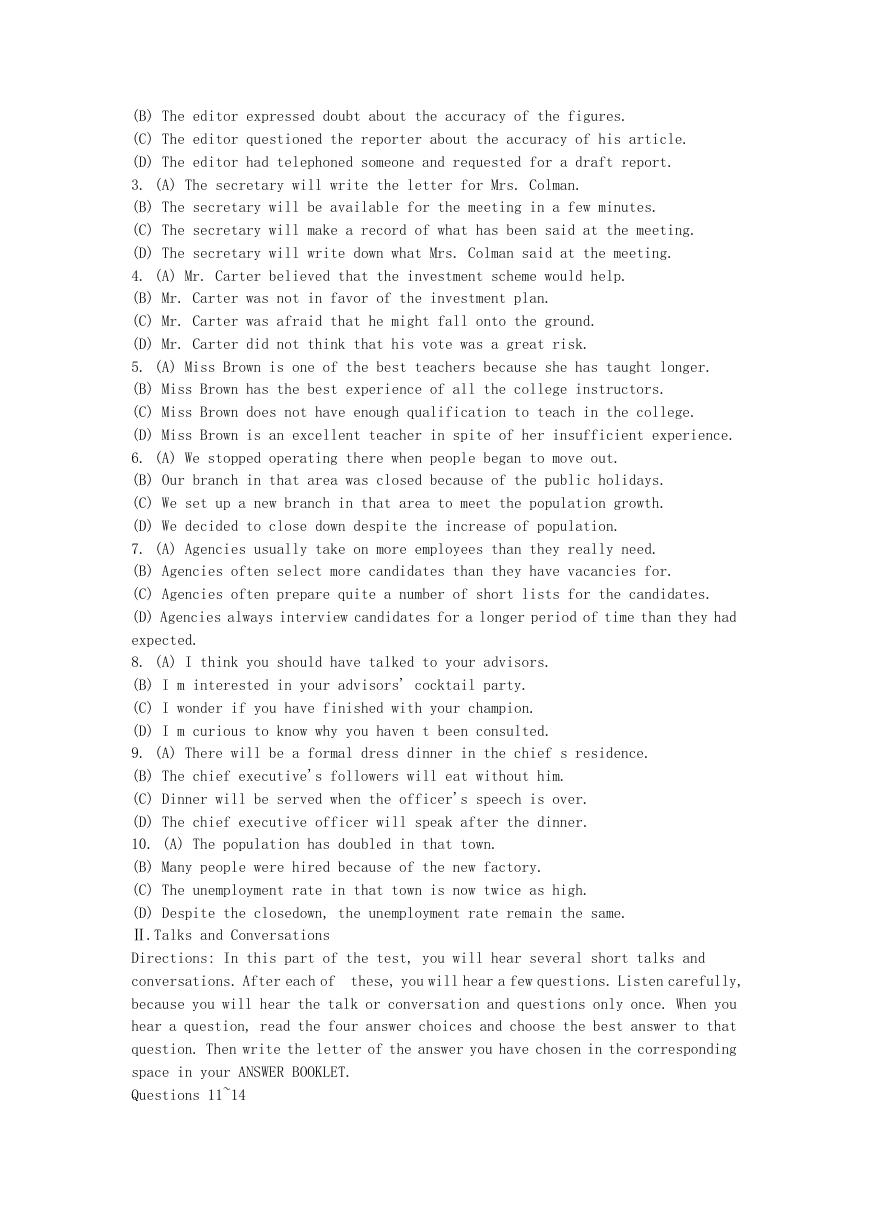
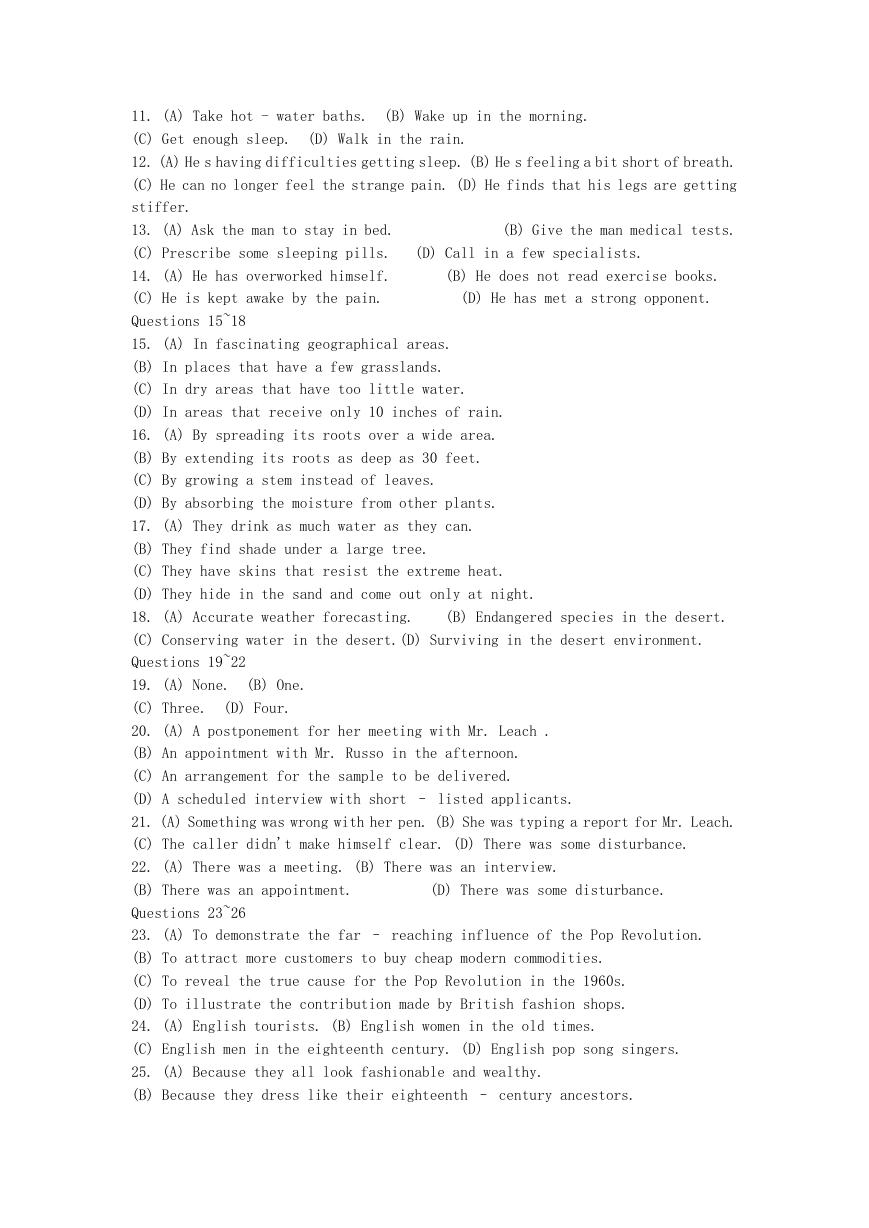
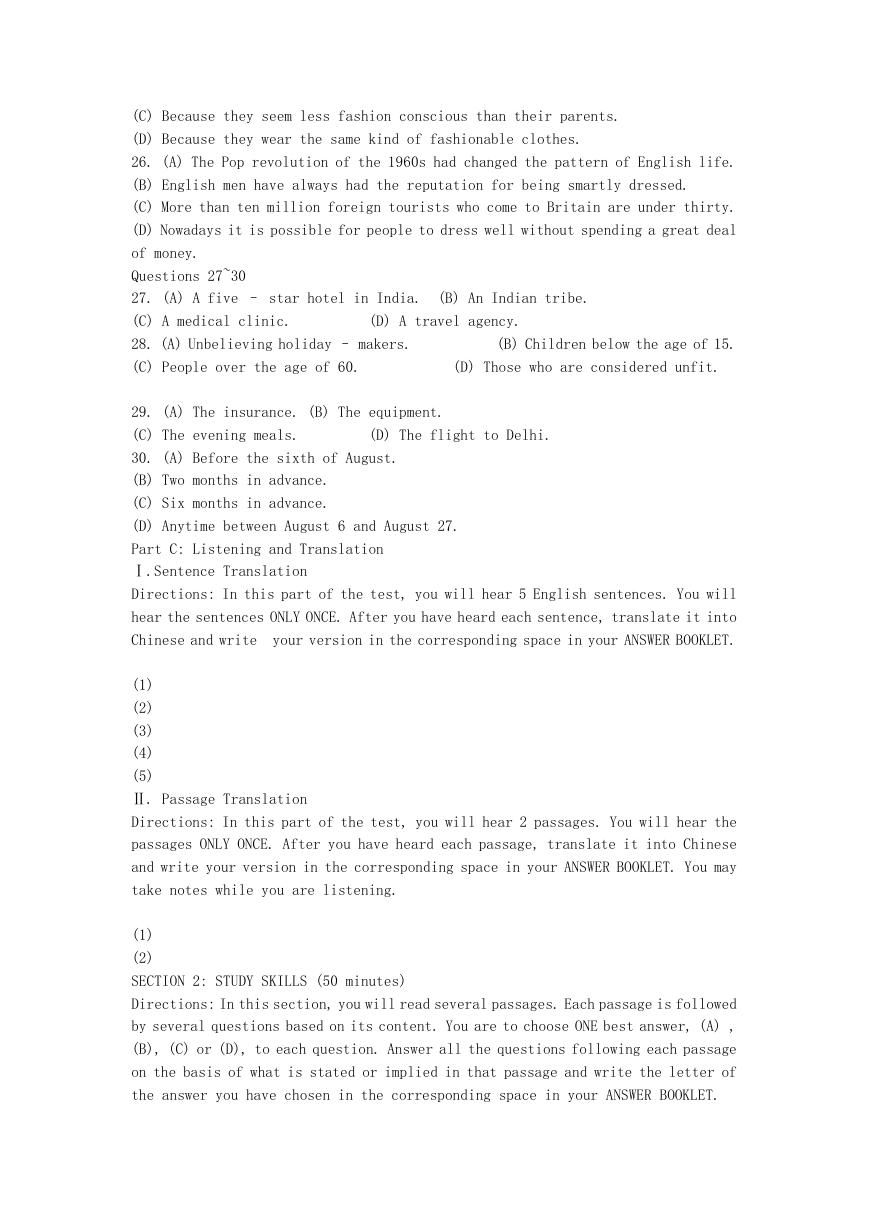
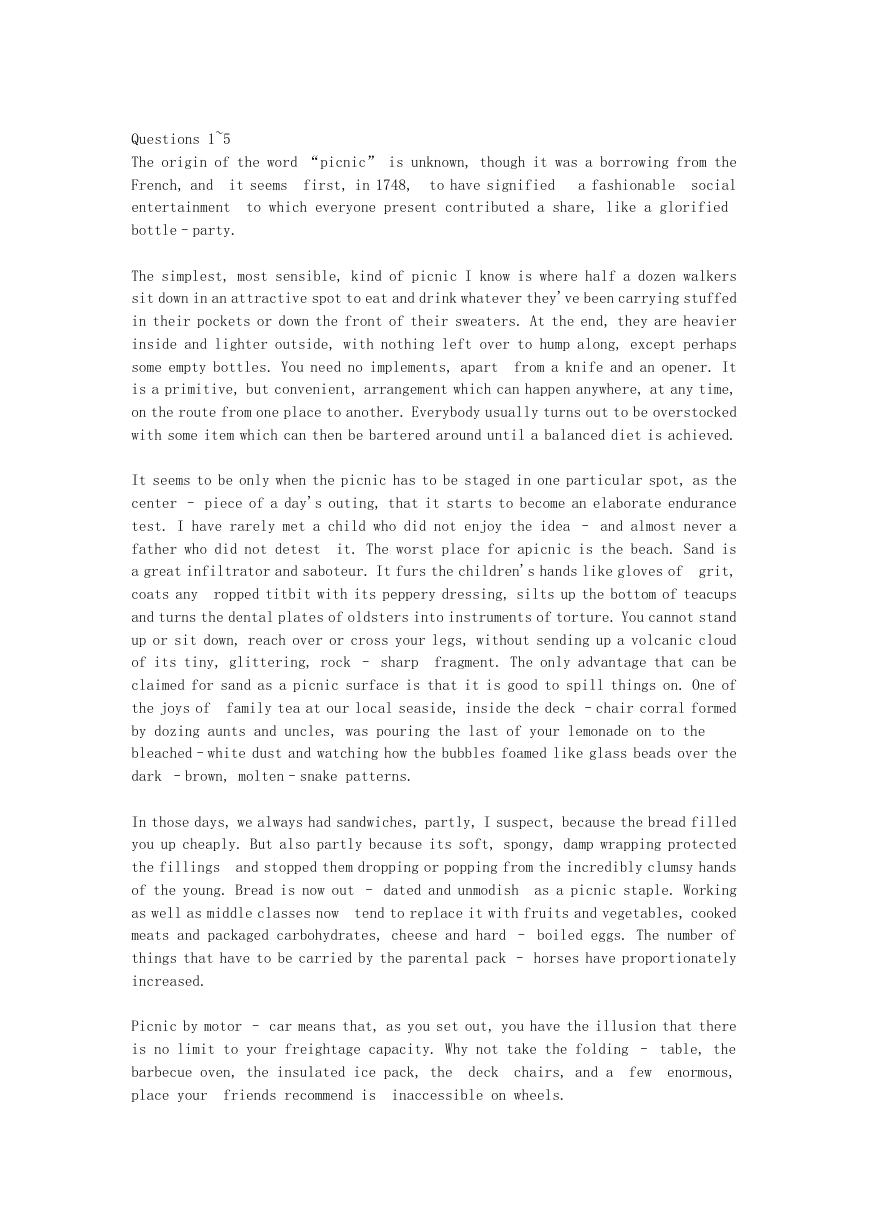
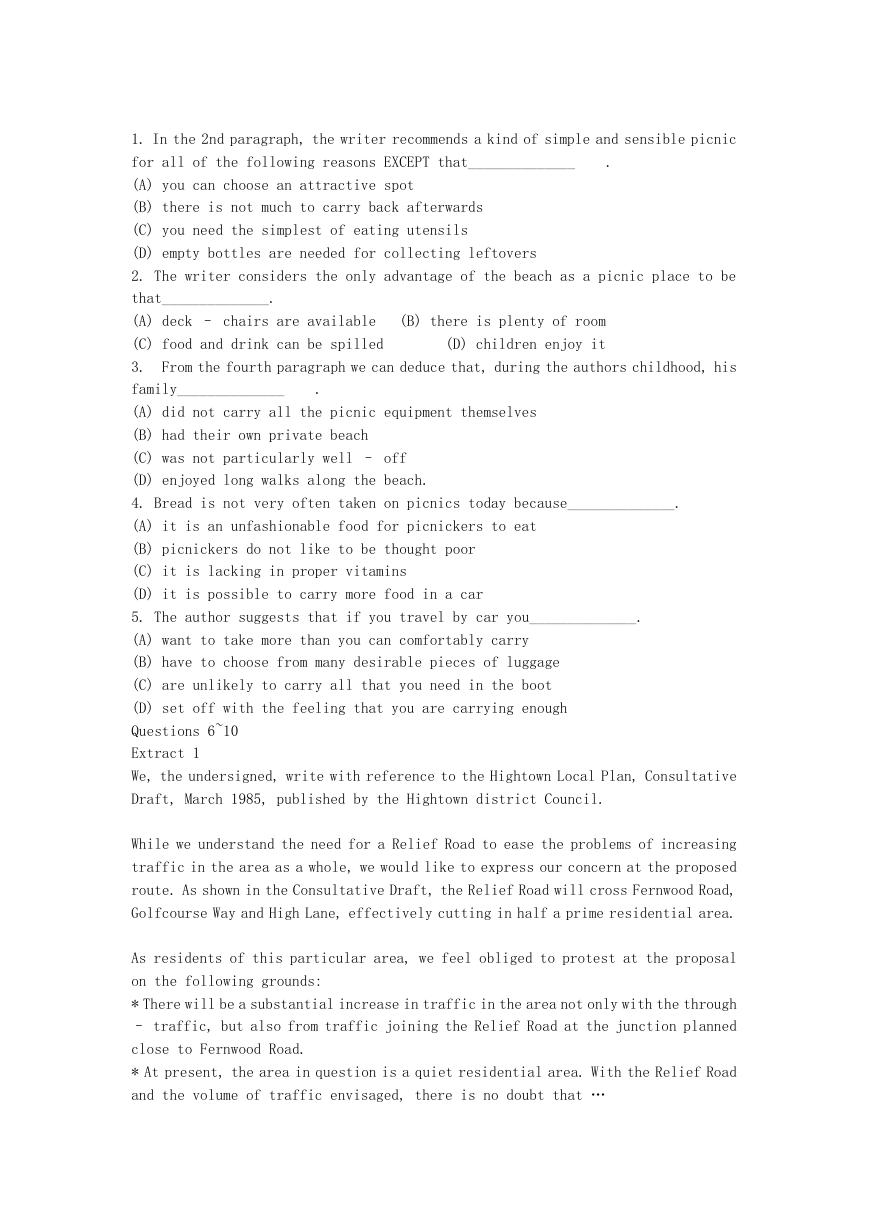

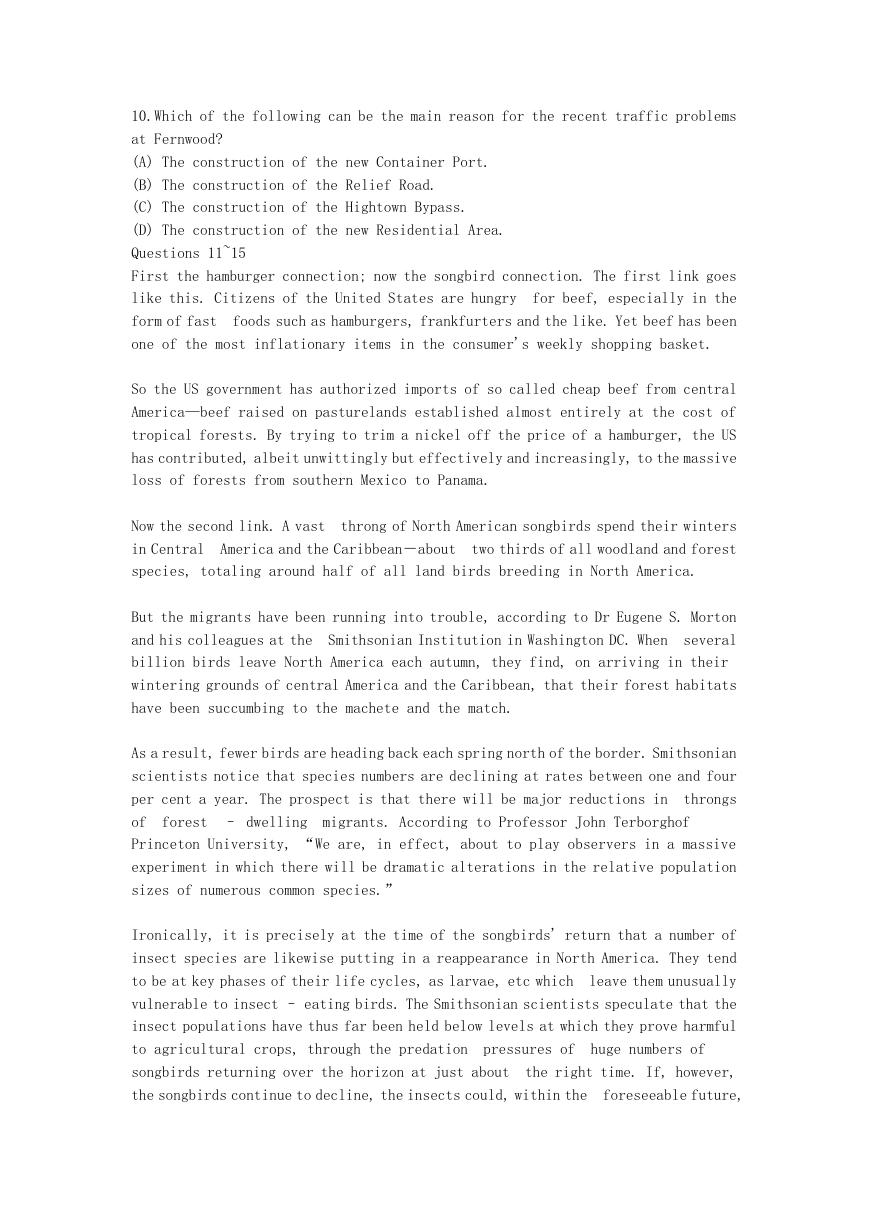








 2023年江西萍乡中考道德与法治真题及答案.doc
2023年江西萍乡中考道德与法治真题及答案.doc 2012年重庆南川中考生物真题及答案.doc
2012年重庆南川中考生物真题及答案.doc 2013年江西师范大学地理学综合及文艺理论基础考研真题.doc
2013年江西师范大学地理学综合及文艺理论基础考研真题.doc 2020年四川甘孜小升初语文真题及答案I卷.doc
2020年四川甘孜小升初语文真题及答案I卷.doc 2020年注册岩土工程师专业基础考试真题及答案.doc
2020年注册岩土工程师专业基础考试真题及答案.doc 2023-2024学年福建省厦门市九年级上学期数学月考试题及答案.doc
2023-2024学年福建省厦门市九年级上学期数学月考试题及答案.doc 2021-2022学年辽宁省沈阳市大东区九年级上学期语文期末试题及答案.doc
2021-2022学年辽宁省沈阳市大东区九年级上学期语文期末试题及答案.doc 2022-2023学年北京东城区初三第一学期物理期末试卷及答案.doc
2022-2023学年北京东城区初三第一学期物理期末试卷及答案.doc 2018上半年江西教师资格初中地理学科知识与教学能力真题及答案.doc
2018上半年江西教师资格初中地理学科知识与教学能力真题及答案.doc 2012年河北国家公务员申论考试真题及答案-省级.doc
2012年河北国家公务员申论考试真题及答案-省级.doc 2020-2021学年江苏省扬州市江都区邵樊片九年级上学期数学第一次质量检测试题及答案.doc
2020-2021学年江苏省扬州市江都区邵樊片九年级上学期数学第一次质量检测试题及答案.doc 2022下半年黑龙江教师资格证中学综合素质真题及答案.doc
2022下半年黑龙江教师资格证中学综合素质真题及答案.doc